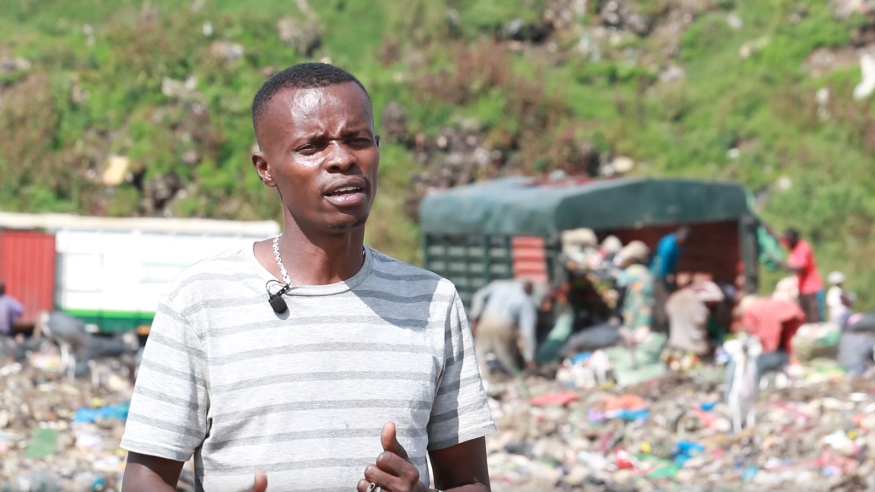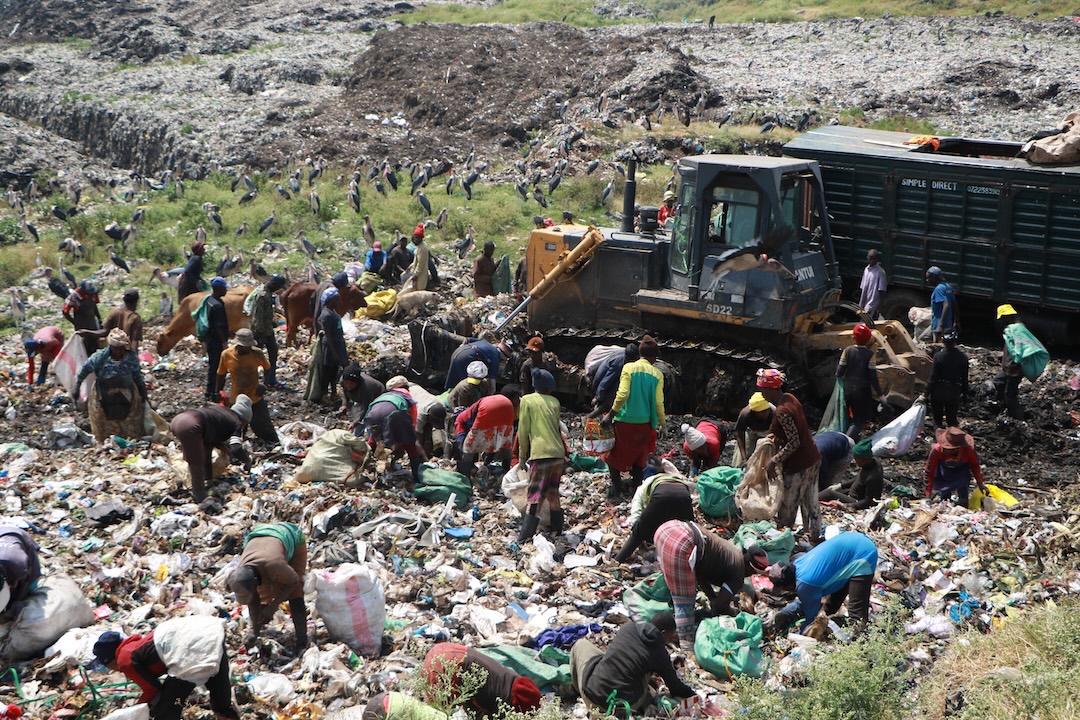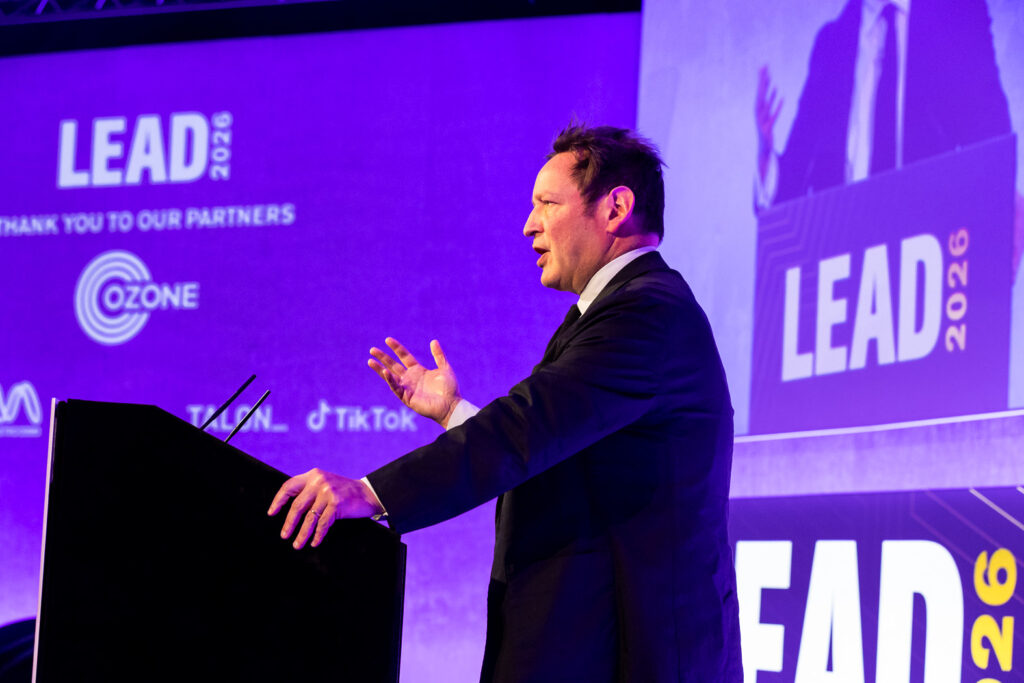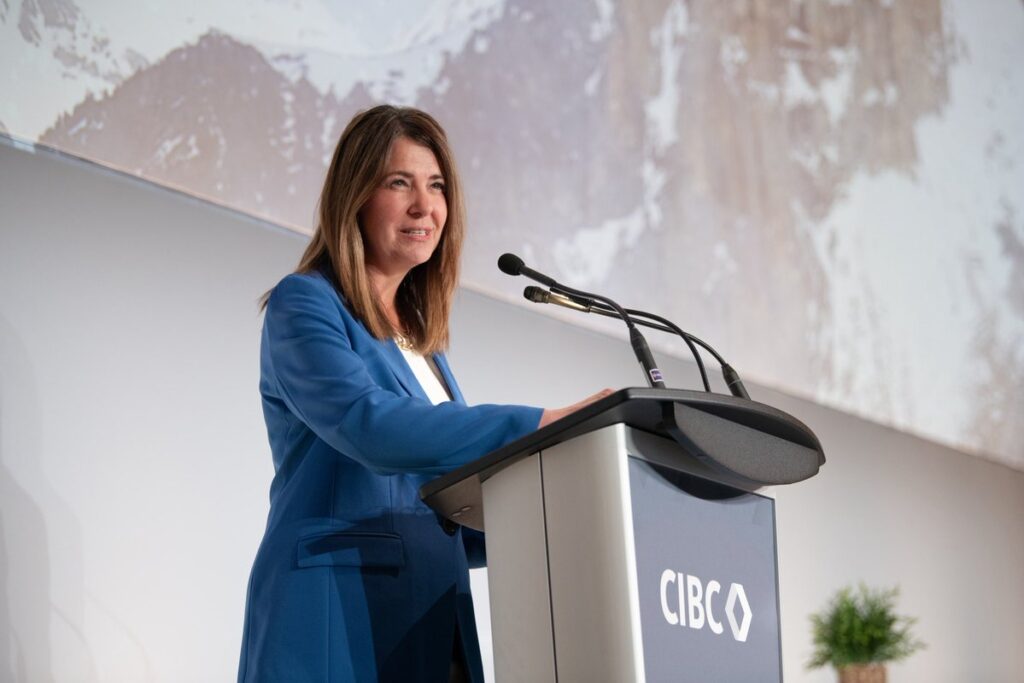This article was developed with the support of Journalismfund Europe.
At Nairobi’s Dandora dumpsite, men, women and children scramble over vast mountains of trash — each waste picker hoping to unearth anything they can sell.
Scavenging silently among them, marabou storks — some nearly five feet tall — wage their own daily contest for survival. A rising wind carries an overwhelming stench and lifts vortexes of black plastic scraps, which swirl past birds and people alike.
Solomon Njoroge, 35, chair of the Nairobi Recyclable Waste Association, began waste picking at the age of eight. He used to earn decent money by collecting and selling high-value plastic waste — rigid plastics such as bottles made from highly recyclable polyethelene terephthalate (PET). Now, he says, he must dig deeper and longer for fewer and fewer bottles because private companies are plucking the high-value plastic from Nairobi’s waste stream before it reaches the dump by collecting it directly from hotels, supermarkets, and gated communities.
“We used to pick. Now we’re just searching,” says Njoroge, swatting away flies. “Many women here scavenge with their children. They have no choice. They can’t afford school fees.”

There are 460 million tonnes of new or “virgin” plastic produced every year, including 428 million tonnes made from fossil fuels. Most of it ends up as plastic waste — 353 million tonnes a year — and just 9 percent of this waste gets recycled annually. The rest will take centuries to degrade.
Most plastic waste ends up in seas, lakes, and rivers — 75 to 199 million tonnes now contaminate the oceans — where it damages ecosystems and injures wildlife. The breakdown of plastic pollution has also created a microplastic health crisis, with extremely tiny, toxic bits of plastic now found in marine and other wildlife, the remotest places on Earth, and throughout the human body.
Despite these risks, global use of plastic is on track to triple by 2060 unless governments commit to rapidly curbing production, and shift to environmentally sound alternatives.
That’s why, just a few miles away from the Dandora dumpsite, governments met in November 2022 at the United Nations headquarters in Nairobi and agreed to craft a legally binding agreement to end plastic pollution. Negotiators are meeting in Geneva this week to finalise the text of the treaty.
As the pact moves closer to completion, lobbyists from Verra, the world’s leading verifier of carbon credits, are pushing to get plastic credits included in the final text, according to a document on Verra’s website. Activists are concerned that the fossil fuel industry, which opposes the inclusion of binding limits on plastic production, will actively push for plastic offsets as well.
If successful, this will likely spur a significant boost in the market for plastic credits, such as those already being sold on the plastic offsets market that Verra itself launched in 2021, in partnership with businesses including Nestlé and Danone.
At the most basic level, a plastic credit is a certificate representing a specific amount of plastic waste that has been removed from the waste stream. The theory is that the purchase of a plastic credit will fund efforts at collection or recycling of plastic that would not have happened otherwise — a concept called “additionality” — which allows the buyer to claim a reduction in their own plastic production, use, or waste.
Many of the projects now selling plastic credits on Verra’s platform are backed by petrochemical companies, such as Dow Chemical, Shell, and ExxonMobil. All of these companies are investing heavily in plastics manufacturing.
Critics argue that plastic credits will serve primarily to justify business as usual in the petrochemicals industry — and that it will be very difficult to know whether a given credit is really backed by additional plastics clean-up or recycling.
Similar concerns have already shaken carbon markets. In 2023, a joint investigation by The Guardian, Die Zeit, and SourceMaterial found that around 94 percent of the “avoided deforestation” carbon credits validated by Verra had not funded additional rainforest conservation. This meant that corporate giants — ranging from from Disney to Shell — that had backed “carbon neutral” products with Verra-approved offsets might have been full of hot air.
Verra’s CEO at the time, David Antonioli, strongly rejected the findings of the investigation and defended Verra’s impact on the conservation of rainforests. He stepped down just months later, and didn’t give a reason for his departure.
Critics also argue that the expanding market for plastic credits risks undercutting informal waste workers, like the pickers at Dandora. While some waste management companies may generate new jobs via revenue raised from selling plastic credits, the mechanism may also undermine the livelihoods of waste pickers and collectors, as companies step in between trash bins and dumpsites to extract the most valuable plastic.
“Net Zero Plastic”?
A project called “Improving Waste Picker Livelihoods in Kenya,” run by Kenya’s largest waste firm, TakaTaka Solutions, sold its first plastics credits earlier this year. The buyer is the UK-based luxury car brand Bentley Motors, which uses plastic credits from TakaTaka Solutions and a number of other projects in the global south, including in India and Thailand, to claim it is “net zero plastic to nature.”
TakaTaka Solutions (named after the Kiswahili word for “rubbish”) has received funding from the Alliance to End Plastic Waste (AEPW), a global initiative backed by some of the world’s largest petrochemical giants, such as Shell, Dow, and ExxonMobil. AEPW also supports several other plastic credit-generating projects across the global south.
TakaTaka Solutions has promised that sale of the credits will fund above-market wages and improved conditions for waste pickers. But at least 10 waste pickers, as well as representatives speaking on behalf of the informal waste sector, said that they have yet to see any benefits from the project, and accused TakaTaka Solutions of cutting them out of the recycling chain.
“TakaTaka Solutions, they are trying to exclude waste pickers by becoming collectors and collecting waste at source,” says Njoroge, leaving behind unrecyclable single-use plastics exported to Kenya from abroad. “They just remain here,” he says. “The dumpsite is like a cemetery where this material is buried and left there.”
Brian Gisore Nyabuti, the chair of the Kenyan National Waste Pickers Welfare Association, echos claims that TakaTaka Solutions is bypassing waste pickers by collecting directly from households. “They only recycle what they can,” he says. “What they can’t, they bring there” — to the landfill — “as mixed waste. So they don’t have a solution.”
TakaTaka Solutions acknowledges that “there is indeed a trend of [high value plastics] being recovered earlier in the chain” but says that responsibility rests with the growing number of companies intercepting the plastic ahead of the dumpsite.
In response to questions, TakaTaka Solutions CEO Daniel Paffenholz said in a statement that the company purchased more than half its plastic from depots where it engaged directly with informal waste pickers, and was “expanding these efforts.”
“On the flip side,” Paffenholz said, “more waste picking is happening in residential areas to compensate, which is a healthier and safer working environment compared to dumpsites.”
According to Verra documentation, the TakaTaka Solutions project began generating credits in 2022, and was formally registered under Verra’s Plastic Waste Reduction Standard in 2024.
The project has sold 15 credits so far, according to TakaTaka Solutions, which says it would “welcome the sale of further credits.”
Verra said that independent verification bodies had confirmed that all projects certified under its Verra Plastic Programme reached appropriate standards.
Subscribe to our newsletter
Stay up to date with DeSmog news and alerts
“All projects certified under the Verra Plastic Program must meet strict stakeholder engagement, and environmental and social safeguard requirements, including compliance with national labor laws,” a Verra spokesperson said.
Nevertheless, experts warn that the concerns expressed by waste pickers about their livelihoods being harmed are emblematic of an inherent risk associated with plastic credits: that promises of future social or environmental benefits may never materialise, even as companies like Bentley Motors claim impact now. Bentley Motors declined to comment.
Taking Credit
Critics also question whether plastic credits always serve to increase the removal of plastic waste from the environment — or even fund it at all.
Under Verra’s verification methodology, projects must prove additionality — that their plastic collection or recycling would not have happened without funding from credit sales, according to a report on plastic credits released in late 2024 by the campaign group Flora and Fauna.
At the same time, Verra’s framework allows credits for work done in the past, which means “the collection and/or recovery activities [went ahead] without the funds generated by a credit,” the report stated, casting doubt on “what additional value they are actually providing.”
Verra’s framework also puts the funding itself in doubt, because credits can enter the market before there is a guaranteed buyer for them. “Projects could go through the project registration and certification process and be issued credits, but then never actually be able to sell them,” stated the report, which also found that the longer credits go unsold, the less likely they are to find a buyer. “There is therefore no guarantee the credit market will generate any revenue for their projects.”
“Waste pickers are already exerting themselves to pick up and recycle all the plastic that they can and that is saleable,” says Neil Tangri, science and policy director at the United States-based campaign Global Alliance for Incinerator Alternatives (GAIA). “So what we are seeing in some cases with the plastic credit companies is that they come in and they basically start taking credit for something that the waste pickers were already doing.”
The brands that buy the credits, he says, “are telling the consumer, look, you can buy our plastic and it doesn’t really count.
“Like, somehow we’re going to make that plastic in your hands magically disappear because waste pickers in Kenya are picking something out of a landfill,” says Tangri. “It is a fantasy that they’re selling guilt-free plastic.”
South Pole, the carbon offsets consultancy that worked with Bentley to purchase the plastic credits, states that the TakaTaka Solutions project “is additional according to Verra’s Plastic Standard methodology,” and that “the project’s publicly available monitoring and verification reports indicate that the plastic waste that enters the recycling facility — including any contaminated waste — is managed responsibly.”
South Pole (which has been described as “the world’s most influential climate consultancy” by corporate watchdog Follow the Money) faced major criticism in 2023 for selling tens of millions of euros worth of carbon credits from Kariba, a Zimbabwe forest conservation project, that turned out to be largely worthless.
The Verra spokesperson said that “to be certified with Verra’s Plastic Program, a project must demonstrate that it collects or recycles plastic waste beyond what would have likely occurred without the project and that this activity was made possible because of the incentives provided through Plastic Credits.”
Verra recently accepted a project resubmitted by another Kenyan waste firm, Mr Green Africa, after its initial application did not demonstrate that it met the criteria, the spokesperson said.
Verra certified both the TakaTaka Solutions and Mr Green Africa projects once they had satisfied the independent verifier, a third-party auditor and Verra’s review team, the spokesperson said.
Mr Green Africa is part-owned by Dow Chemical, a major producer of single-use plastics.
Mr Green Africa said in a statement that “in countries such as Kenya…plastic credits could provide an additional revenue stream” that might help the the company achieve profitability, allowing it to expand its processing capacity, improve pay and conditions for waste pickers, and “adjust and improve our approach to working with them.”
Companies generating plastic credits say they are developing a vital part of the infrastructure needed to tame the global scourge of plastic waste, which will take time to reach its potential. But critics, such as Gerance Mutwol, a plastics campaigner at Greenpeace Africa, fear that plastic credits may mostly serve to help petrochemical companies deflect pressure to slash plastic production.
Plastic credits are “usually more of a greenwashing tactic for companies to just run away from responsibility,” he contends. “If you ask waste pickers what’s changed since these credit projects started, they’ll tell you: nothing. No new money, no better conditions.”
“We don’t need plastic offsets in the Global Plastics Treaty,” says Mutwol. “We need plastic reduction, reuse, refilling and better plastic packaging design for achieving zero waste.”

Subscribe to our newsletter
Stay up to date with DeSmog news and alerts








